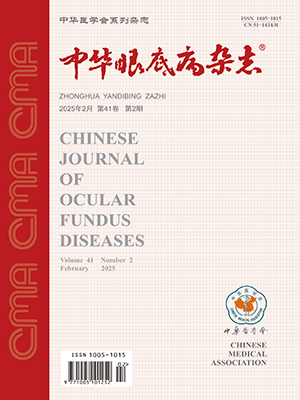| 1. |
Constable IJ, Pierce CM, Lai CM, et al. Phase 2a randomized clinical trial: safety and post hoc analysis of subretinal rAAV. sFLT-1for wet age-related macular degeneration[J]. EBioMedicine, 2016, 14: 168-175. DOI: 10.1016/j.ebiom.2016.11.016.
|
| 2. |
Yin D, Ling S, Wang D, et al. Targeting herpes simplex virus with CRISPR-Cas9 cures herpetic stromal keratitis in mice[J]. Nat Biotechnol, 2021, 39(5): 567-577. DOI: 10.1038/s41587-020-00781-8.
|
| 3. |
沈科炯, 沈吟. 遗传性视网膜疾病腺相关病毒载体基因治疗新进展[J]. 中华眼底病杂志, 2020, 36(3): 242-248. DOI: 10.3760/cma.j.cn511434-20190705-00214.Shen KJ, Shen Y. New advances in gene therapy with adenoviral vectors for inherited retinal diseases[J]. Chin J Ocul Fundus Dis, 2020, 36(3): 242-248. DOI: 10.3760/cma.j.cn511434-20190705-00214.
|
| 4. |
Timmers AM, Newmark JA, Turunen HT, et al. Ocular inflammatory response to intravitreal injection of adeno-associated virus vector: relative contribution of genome and capsid[J]. Hum Gene Ther, 2020, 31(1-2): 80-89. DOI: 10.1089/hum.2019.144.
|
| 5. |
Bainbridge JWB, Mehat MS, Sundaram V, et al. Long-term effect of gene therapy on Leber’s congenital amaurosis[J]. N Engl J Med, 2015, 372(20): 1887-1897. DOI: 10.1056/NEJMoa1414221.
|
| 6. |
Sauter MM, Kolb AW, Brandt CR. Toll-like receptors 4, 5, 6 and 7 are constitutively expressed in non-human primate retinal neurons[J]. J Neuroimmunol, 2018, 322: 26-35. DOI: 10.1016/j.jneuroim.2018.06.007.
|
| 7. |
Chandler LC, Barnard AR, Caddy SL, et al. Enhancement of adeno-associated virus-mediated gene therapy using hydroxychloroquine in murine and human tissues[J]. Mol Ther Methods Clin Dev, 2019, 14: 77-89. DOI: 10.1016/j.omtm.2019.05.012.
|
| 8. |
Liu YF, Huang S, Ng TK, et al. Longitudinal evaluation of immediate inflammatory responses after intravitreal AAV2 injection in rats by optical coherence tomography[J/OL]. Exp Eye Res, 2020, 193: 107955[2020-02-01]. https://pubmed.ncbi.nlm.nih.gov/32017940/. DOI: 10.1016/j.exer.2020.107955.
|
| 9. |
Boutin S, Monteilhet V, Veron P, et al. Prevalence of serum lgG and neutralizing factors against adeno-associated virus (AAV) types 1, 2, 5, 6, 8, and 9 in the healthy population: implications for gene therapy using AAV vectors[J]. Hum Gene Ther, 2010, 21(6): 704-712. DOI: 10.1089/hum.2009.182.
|
| 10. |
Ronzitti G, Gross DA, Mingozzi F. Human immune responses to adeno-associated virus (AAV) vectors[J]. Front Immunol, 2020, 11: 670. DOI: 10.3389/fimmu.2020.00670.
|
| 11. |
Greenberg B, Butler J, Felker GM, et al. Prevalence of AAV1 neutralizing antibodies and consequences for a clinical trial of gene transfer for advanced heart failure[J]. Gene Ther, 2016, 23(3): 313-319. DOI: 10.1038/gt.2015.109.
|
| 12. |
Lee JH, Wang JH, Chen J, et al. Gene therapy for visual loss: opportunities and concerns[J]. Prog Retin Eye Res, 2019, 68: 31-53. DOI: 10.1016/j.preteyeres.2018.08.003.
|
| 13. |
Kumar SRP, Hoffman BE, Terhorst C, et al. The balance between CD8+ T cell-mediated clearance of AAV-encoded antigen in the liver and tolerance is dependent on the vector dose[J]. Mol Ther, 2017, 25(4): 880-891. DOI: 10.1016/j.ymthe.2017.02.014.
|
| 14. |
Cukras C, Wiley HE, Jeffrey BG, et al. Retinal AAV8-RS1 gene therapy for X-linked retinoschisis: initial findings from a phase Ⅰ/Ⅱa trial by intravitreal delivery[J]. Mol Ther, 2018, 26(9): 2282-2294. DOI: 10.1016/j.ymthe.2018.05.025.
|
| 15. |
Gange WS, Sisk RA, Besirli CG, et al. Perifoveal chorioretinal atrophy after subretinal voretigene neparvovec-rzyl for RPE65-mediated Leber congenital amaurosis[J]. Ophthalmol Retina, 2022, 6(1): 58-64. DOI: 10.1016/j.oret.2021.03.016.
|
| 16. |
Sodi A, Banfi S, Testa F, et al. RPE65-associated inherited retinal diseases: consensus recommendations for eligibility to gene therapy[J]. Orphanet J Rare Dis, 2021, 16(1): 257. DOI: 10.1186/s13023-021-01868-4.
|
| 17. |
Williams A, Flavell RA, Eisenbarth SC. The role of NOD-like receptors in shaping adaptive immunity[J]. Curr Opin Immunol, 2010, 22(1): 34-40. DOI: 10.1016/j.coi.2010.01.004.
|
| 18. |
韩如意, 金子兵. 遗传性眼底病基因和干细胞治疗趋势与面临的挑战和机遇[J]. 中华眼底病杂志, 2018, 34(6): 519-525. DOI: 10.3760/cma.j.issn.1005-1015.2018.06.001.Han RY, Jin ZB. Progress and opportunities of gene and stem cell therapy on hereditary ocular fundus diseases[J]. Chin J Ocul Fundus Dis, 2018, 34(6): 519-525. DOI: 10.3760/cma.j.issn.1005-1015.2018.06.001.
|
| 19. |
Li W, Asokan A, Wu Z, et al. Engineering and selection of shuffled AAV genomes: a new strategy for producing targeted biological nanoparticles[J]. Mol Ther, 2008, 16(7): 1252-1260. DOI: 10.1038/mt.2008.100.
|
| 20. |
Seitz IP, Michalakis S, Wilhelm B, et al. Superior retinal gene transfer and biodistribution profile of subretinal versus intravitreal delivery of AAV8 in nonhuman primates[J]. Invest Ophthalmol Vis Sci, 2017, 58(13): 5792-5801. DOI: 10.1167/iovs.17-22473.
|
| 21. |
Pavlou M, Schön C, Occelli LM, et al. Novel AAV capsids for intravitreal gene therapy of photoreceptor disorders[J/OL]. EMBO Mol Med, 2021, 13(4): e13392[2021-04-09]. https://pubmed.ncbi.nlm.nih.gov/33616280/. DOI: 10.15252/emmm.202013392.
|
| 22. |
Ding K, Shen J, Hafiz Z, et al. AAV8-vectored suprachoroidal gene transfer produces widespread ocular transgene expression[J]. J Clin Invest, 2019, 129(11): 4901-4911. DOI: 10.1172/JCI129085.
|
| 23. |
Yeh S, Khurana RN, Shah M, et al. Efficacy and safety of suprachoroidal CLS-TA for macular edema secondary to noninfectious uveitis: phase 3 randomized trial[J]. Ophthalmology, 2020, 127(7): 948-955. DOI: 10.1016/j.ophtha.2020.01.006.
|
| 24. |
杨培增. 关注我国葡萄膜炎的病因和类型的变化[J]. 中华眼科杂志, 2008, 44(10): 865-866. DOI: 10.3321/j.issn:0412-4081.2008.10.001.Yang PZ. Concern on the changes of clinical pattern and etiological factors in uveitis in China[J]. Chin J Ophthalmol, 2008, 44(10): 865-866. DOI: 10.3321/j.issn:0412-4081.2008.10.001.
|
| 25. |
Shen J, Kim J, Tzeng SY, et al. Suprachoroidal gene transfer with nonviral nanoparticles[J/OL]. Sci Adv, 2020, 6(27): eaba1606[2020-07-03]. https://pubmed.ncbi.nlm.nih.gov/32937452/. DOI: 10.1126/sciadv.aba1606.
|




